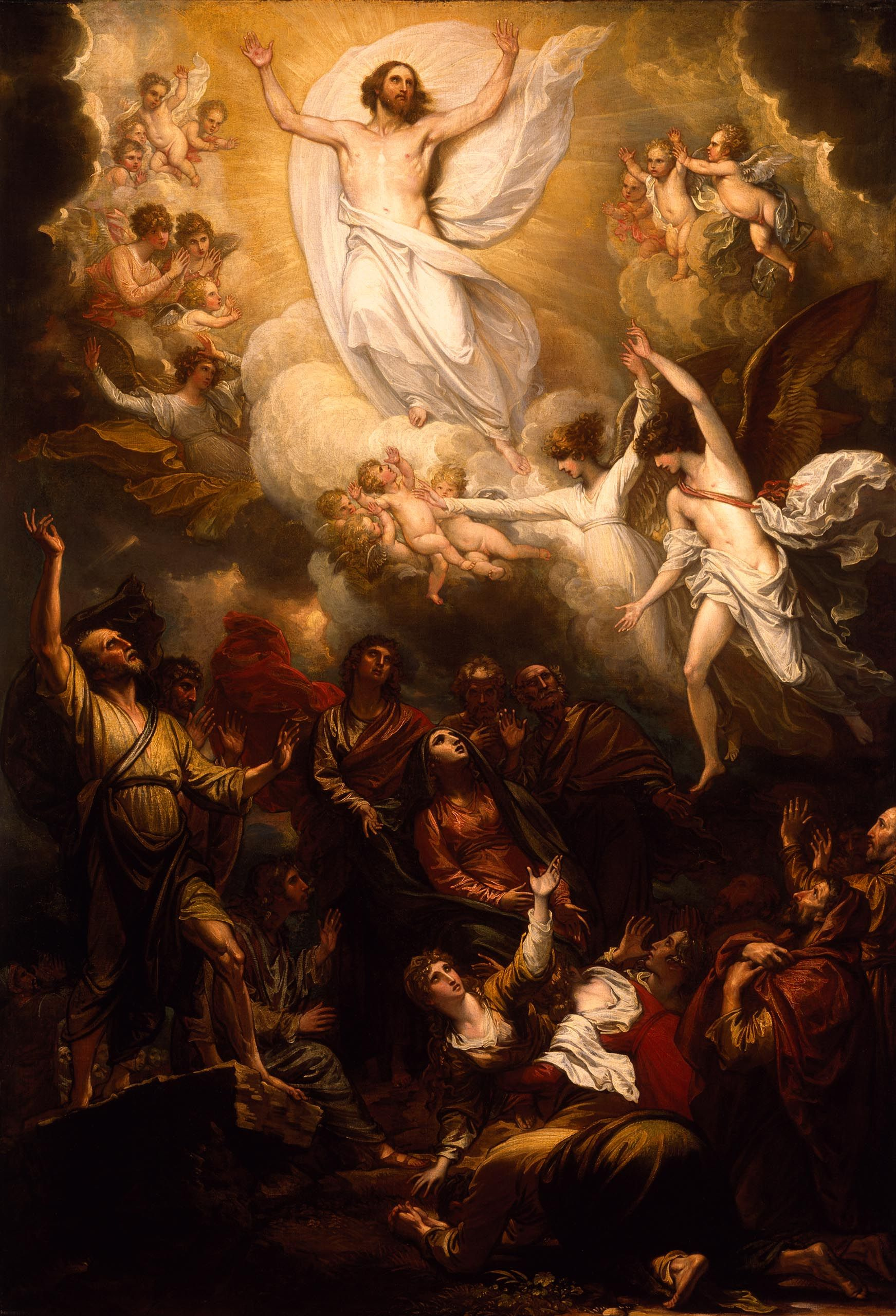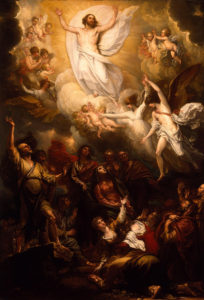Central idea and Doctrine: The Ascension. Practical application: Children of the Father.
To view the Lectionary 58 readings, click here.
Central idea: The Ascension
Reading 1 Acts 1:1-11
In the first book, Theophilus,
I dealt with all that Jesus did and taught
until the day he was taken up,
after giving instructions through the Holy Spirit
to the apostles whom he had chosen.
He presented himself alive to them
by many proofs after he had suffered,
appearing to them during forty days
and speaking about the kingdom of God.
While meeting with them,
he enjoined them not to depart from Jerusalem,
but to wait for “the promise of the Father
about which you have heard me speak;
for John baptized with water,
but in a few days you will be baptized with the Holy Spirit.”When they had gathered together they asked him,
“Lord, are you at this time going to restore the kingdom to Israel?”
He answered them, “It is not for you to know the times or seasons
that the Father has established by his own authority.
But you will receive power when the Holy Spirit comes upon you,
and you will be my witnesses in Jerusalem,
throughout Judea and Samaria,
and to the ends of the earth.”
When he had said this, as they were looking on,
he was lifted up, and a cloud took him from their sight.
While they were looking intently at the sky as he was going,
suddenly two men dressed in white garments stood beside them.
They said, “Men of Galilee,
why are you standing there looking at the sky?
This Jesus who has been taken up from you into heaven
will return in the same way as you have seen him going into heaven.”
- As much as they might like to, the Apostles are not going to know the future, except that soon the Holy Spirit will come upon them and that someday Christ will return.
- We don’t know the future either.
- The Apostles will be given power by the Holy Spirit to work in the present time, to understand God’s message, and to witness it.
- We have this same power.
- They are to spread the Gospel from the center, Jerusalem, out to what was left of the Jewish kingdom (Judea), out to the lands which were once Jewish (Samaria), and out to the entire world.
- We are to continue this work.
Responsorial Psalm Ps 47:2-3, 6-7, 8-9
R. God mounts his throne to shouts of joy: a blare of trumpets for the Lord or Alleluia
All you peoples, clap your hands,
shout to God with cries of gladness,
For the LORD, the Most High, the awesome,
is the great king over all the earth.God mounts his throne amid shouts of joy;
the LORD, amid trumpet blasts.
Sing praise to God, sing praise;
sing praise to our king, sing praise.For king of all the earth is God;
sing hymns of praise.
God reigns over the nations,
God sits upon his holy throne.
- How do human beings express joy? Communally, we do it with glad shouts and cries, songs, and music, the louder the better.
- What is this occasion of joy? Christ has ascended into heaven where he sits at the right hand of God the Father.
- God is ultimately the king of this world, but he has left it in our hands, we who are good, indifferent, and bad stewards.
- We will sing this praise anew if we enter the Kingdom of God in heaven where Christ reigns.
- If we are his disciples, we will doubly sing this praise in the New Creation when Christ reigns as its visible king.
Reading 2 Eph 1:17-23
Brothers and sisters:
May the God of our Lord Jesus Christ, the Father of glory,
give you a Spirit of wisdom and revelation
resulting in knowledge of him.
May the eyes of your hearts be enlightened,
that you may know what is the hope that belongs to his call,
what are the riches of glory
in his inheritance among the holy ones,
and what is the surpassing greatness of his power
for us who believe,
in accord with the exercise of his great might,
which he worked in Christ,
raising him from the dead
and seating him at his right hand in the heavens,
far above every principality, authority, power, and dominion,
and every name that is named
not only in this age but also in the one to come.
And he put all things beneath his feet
and gave him as head over all things to the church,
which is his body,
the fullness of the one who fills all things in every way.
- Paul wants the Christians at Ephesians to know and experience what they can hope for, based on the exalted status of the Church, based on the exalted status of Christ, based on the power and authority of God.
- God possesses the fullness of being, goodness, truth, beauty, and power. God in Christ has revealed that within the one God are three persons, alluded to here: The Father of glory, the Lord Jesus Christ, and the Spirit of wisdom. In raising him from the dead, God has given the Son supreme power and glory.
- The Son is head of his body the Church, “the fullness of the one who fills all things in every way.”
- Thus, our inheritance is God himself, which means to share in the life of God.
Alleluia Mt 28:29a, 20b
Go and teach all nations, says the Lord;
I am with you always, until the end of the world.
- The Great Commission is to “Go and teach all nations.”
- “I am with you always” is why and how Christ’s disciples carry the Commission out.
Gospel Mt 28:16-20
The eleven disciples went to Galilee,
to the mountain to which Jesus had ordered them.
When they saw him, they worshiped, but they doubted.
Then Jesus approached and said to them,
“All power in heaven and on earth has been given to me.
Go, therefore, and make disciples of all nations,
baptizing them in the name of the Father,
and of the Son, and of the Holy Spirit,
teaching them to observe all that I have commanded you.
And behold, I am with you always, until the end of the age.”
- One who commissions another can only do so based on the legitimate authority he possesses.
- Jesus’ authority is universal: “All power in heaven and on earth has been given to me.”
- Those who are commissioned can only do the work they are commissioned to do.
- The Apostles have a commission to “all nations.”
- What are they commissioned to do? “Go, therefore, and make disciples of all nations, baptizing them in the name of the Father, and of the Son, and of the Holy Spirit, teaching them to observe all that I have commanded you.”
- They are to announce the Gospel to all.
- They are to baptize into the Trinity anyone who accepts the Gospel.
- They are to teach the baptized the way of love Christ has taught the Apostles.
Doctrine: The Ascension
- In the Creed we proclaim that Our Lord “ascended into heaven and is seated at the right hand of the Father.” What does it mean to “ascend into heaven” and to be “seated at the right hand of the Father”?
- Christ ascends in a glorified body. Christ’s body was glorified at the moment of his Resurrection. But when he appeared to his disciples, he kept his full glory veiled. Now in heaven, Christ’s full glory shines forth. St. Paul got a glimpse of this post-Ascension glory on the road to Damascus. (CCC 659)
- Christ is a kind of road from earth to heaven. Christ’s Ascension or going up to heaven completes his Incarnation or coming down to earth. Christ has opened the way to heaven for us. (CCC 661)
- “Jesus Christ, the head of the Church, precedes us into the Father’s glorious kingdom so that we, the members of his Body, may live in the hope of one day being with him for ever” (CCC 666).
- Christ is the means by which we can travel this road. By ascending from earth to heaven, Christ did not just open a way for us to follow as best we can. Rather, he is the way. Christ promised his disciples, “And I, when I am lifted up from the earth, will draw all men to myself.” He does this by interceding for us to the Father, resulting in the outpouring of the Holy Spirit. (CCC 662)
- “Jesus Christ, having entered the sanctuary of heaven once and for all, intercedes constantly for us as the mediator who assures us of the permanent outpouring of the Holy Spirit” (CCC 667).
- Christ the King is the destination of this journey. Being seated at the right hand of the Father means Christ has “the glory and honor of divinity” (CCC 663).
- Being seated at the right hand of the Father is the fulfillment of “the prophet Daniel’s vision concerning the Son of man: ‘To him was given dominion and glory and kingdom, that all peoples, nations, and languages should serve him; his dominion is an everlasting dominion, which shall not pass away, and his kingdom one that shall not be destroyed’” (CCC 664).
Practical application: Children of the Father
- It is right to love, honor, respect, and obey many persons, beginning with our own parents. However, the Church uses the term latria to refer to the supreme loving worship or adoration which belongs only to God.[1] As Matthew wrote about the final meeting of the apostles with the risen Christ, “When they saw him, they worshiped.”
- While there are many reasons and ways to adore God, Christians uniquely adore God the Father as his children.
- As the Catechism of the Catholic Church puts it, “We can adore the Father because he has caused us to be reborn to his life by adopting us as his children in his only Son: by Baptism, he incorporates us into the Body of his Christ; through the anointing of his Spirit who flows from the head to the members, he makes us other ‘Christs’” (CCC 2782).
- Cyril of Jerusalem explains, “God, indeed, who has predestined us to adoption as his sons, has conformed us to the glorious Body of Christ. So then you who have become sharers in Christ are appropriately called ‘Christs.’” (CCC 2782)
- About this, St. Cyprian says, “The new man, reborn and restored to his God by grace, says first of all, ‘Father!’ because he has now begun to be a son” (CCC 2782).
- This insight should allow us to pray the Lord’s Prayer in a new way. We can say “Our Father” because we really are his sons and daughters.
- Every time we have the occasion to consider God as Father, we can realize that through the ascended Christ, we are reborn and adopted into, conformed to, and sharers in God’s own divine life.
Aspirations
- Jesus, my Lord and my God, may I know You.
- Lord Jesus, You are with me always.
- Christ, You are my road and my journey’s end.
- Father!
The Homiletic Directory recommends the following Catechism points for the theme of the Ascension for the Solemnity of the Ascension of the Lord:
- CCC 659-672, 697, 792, 965, 2795: the Ascension
[1] http://www.catholicculture.org/culture/library/dictionary/index.cfm?id=34505


Leave a Reply